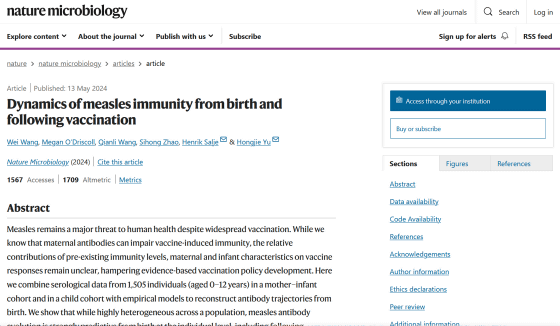Study finds measles vaccine less effective in babies born by cesarean section

Dynamics of measles immunity from birth and following vaccination | Nature Microbiology
https://www.nature.com/articles/s41564-024-01694-x

Birth by C-section more than doubles odds of measles vaccine failure | University of Cambridge
https://www.cam.ac.uk/research/news/birth-by-c-section-more-than-doubles-odds-of-measles-vaccine-failure
How You Were Born Could Change Your Response to Life-Saving Medicine: ScienceAlert
https://www.sciencealert.com/how-you-were-born-could-change-your-response-to-life-saving-medicine
The proportion of caesarean sections in childbirth is increasing year by year, and according to a survey by the Ministry of Health, Labor and Welfare, the proportion of caesarean sections in Japan reached 27.4% in 2020, which means that one in four women are born by caesarean section. In addition, about one-third of all births in the UK and more than half of all births in Brazil and Turkey are by caesarean section.
On the other hand, it has been pointed out that babies born by Caesarean section are unable to acquire bacteria from their mother's vagina, and that their intestinal flora is different from that of babies born naturally. It is said that the differences in intestinal flora disappear after nine months of age, but research has shown that children born by Caesarean section are more likely to develop childhood obesity, asthma, and diabetes, and that applying the mother's vaginal secretions to the baby has benefits for brain development.
Applying mother's vaginal secretions to babies may benefit brain development - GIGAZINE

A research team from Cambridge University in the UK and Fudan University in China analyzed data from a previous study of more than 1,500 babies born in Hunan province, China. In the previous study, blood samples were taken every few weeks from birth until the age of 12, allowing researchers to examine how measles antibody levels changed.
The analysis found that the proportion of babies who did not have an immune response to the first measles vaccine was about 5% among babies born naturally, but 12% (2.56 times) among babies born by Caesarean section.
Fortunately, a second dose of the measles vaccine can provide immunity to measles to babies who did not develop an immune response to the first dose. However, according to the World Health Organization (WHO), the measles vaccination rate in 2021 was a record low of 81% , and only 71% of people had received the second dose, making low vaccination rates a global problem.
Measles is a dangerous disease that causes cold-like symptoms such as fever and coughing, as well as a rash, and causes encephalitis in one in 1,000 people, and even in developed countries, one in 1,000 people who contract it die. The measles virus is highly contagious, so it spreads from person to person through the air, triggered by coughing or sneezing.
The most effective way to prevent measles is vaccination, but achieving herd immunity requires a vaccination rate of at least 95%. In recent years, as vaccination rates have remained low, measles epidemics have occurred frequently even in developed countries such as the United States.

Professor Henrik Salje from the University of Cambridge, co-author of the paper, said: 'Unlike vaginal birth, during a Caesarean section the baby is not exposed to the mother's microbiome. We think this means it takes longer for the gut flora to develop and may also reduce the baby's ability to activate the immune system with vaccines against diseases including measles. 'We want to follow up infants born by Caesarean section to receive a second dose of the measles vaccine because they are more likely to fail the first vaccination.'
Related Posts:
in Science, Posted by log1h_ik







